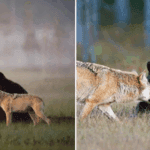In a world as diverse and intricate as our own, people across the planet often share more in common than we might expect—especially when it comes to matters of the unseen. Recent research spanning six continents reveals that the idea of life after death is not just a relic of ancient traditions, but a living, breathing conviction for most of the world’s population. Not only do people believe we persist beyond our earthly lives, but many also sense that spirits infuse the very landscapes and creatures around us.
The Spiritual Pulse of the Planet
A sweeping survey conducted by the Pew Research Center, involving over 50,000 adults from 36 countries, offers a panoramic view of spiritual beliefs. The study, notable for its global reach and breadth of questions, investigates not only conventional religious attachments but also less formal spiritual concepts.
Interestingly, while belief in a deity tends to be more prevalent among older generations, the belief that life continues after death and that spirits exist in animals or natural features like mountains, rivers, and trees is remarkably consistent across age groups. In fact, younger adults are just as likely—or sometimes even more likely—than their elders to embrace these ideas.
Spirits in Animals and Nature: A Universal Connection
One of the most striking findings is how widespread the belief is that animals possess spirits or spiritual energies. This conviction is not confined to any single faith or region. For example:
- India: 83% of adults accept that animals have spirits.
- Turkey: 81% of adults, despite the country’s Muslim majority, agree.
- Argentina: 76% of adults, most of whom are Christian, share this belief.
- Israel: 70% of adults, predominantly Jewish, affirm this idea.
Similarly, many people believe that parts of the natural world—mountains, rivers, or trees—are inhabited by spirits. This belief is particularly strong in countries like Chile (74%) and Thailand (73%), and is also present in Muslim-majority Indonesia (57%).
Even in the United States, where religious diversity is high and secularism is on the rise, a substantial portion of the population holds these beliefs. About 57% of American adults think animals have spirits, and 48% believe the same about natural features. This is noteworthy, considering that about six in ten Americans identify as Christian and three in ten are religiously unaffiliated.
The Role of Objects and Spiritual Energies
While the belief in spirits residing in animals and nature is widespread, fewer people extend this idea to inanimate objects like crystals, jewels, or stones. In most countries surveyed, only a minority believe these objects can harbor spiritual energies. This suggests that spiritual beliefs are more likely to be attached to living or dynamic elements of the world.
Read more: Pilot Saves The Lives Of 147 Passengers After ‘Hearing Voice’ That Made Him Take Off 3 Minutes Early
Spiritual Beliefs in Secular Societies
It is particularly fascinating to observe that spiritual beliefs persist even in societies where organized religion is on the decline. Take Japan, for example: more than half of Japanese adults are religiously unaffiliated, yet 53% believe animals have spirits, and 56% believe parts of nature are spiritually charged. This highlights how spirituality can exist independently of formal religious structures.
Age and Spiritual Beliefs
Traditionally, older adults have been more religious than younger ones, at least when it comes to conventional measures like attendance at religious services or the importance of religion in daily life. However, when it comes to beliefs in spirits, life after death, and reincarnation, the age gap narrows or even reverses.
In about half of the countries surveyed, young adults (ages 18 to 34) are more likely than the oldest adults (ages 50 and older) to believe that animals have spirits. In no country is the reverse true to a significant degree. Similarly, in ten countries, young adults are more likely to believe in reincarnation—the idea that people are reborn in this world again and again. Only in Nigeria do older adults outpace the young in this belief.
Despite these trends, older adults still tend to be more religious in traditional terms. For example, in Thailand, 80% of people over 50 say religion is very important in their lives, compared to just 50% of those under 35.
Life After Death: A Global Perspective
When asked simply about “life after death”—rather than specific concepts like heaven or hell—a majority of adults in most surveyed countries say they believe in an afterlife. For instance:
- Indonesia: 85% of adults believe in life after death.
- Kenya: 80% of adults share this belief.
- Latin America: About two-thirds of adults across six countries affirm the idea.
In some places, younger adults are more likely than older ones to believe in an afterlife. However, in the United States and Canada, the oldest adults are slightly more likely to hold this belief.
In the U.S., 70% of adults say there is definitely or probably life after death. For comparison, 67% believe in heaven, and 55% believe in hell, according to recent surveys.
Read more: Banned Sacred Text Claims Jesus Didn’t Die The Way We’ve Always Believed
Religion, Spirituality, and Everyday Life
The survey reveals that, in many countries, large percentages of people say religion is very important in their lives—especially in South and Southeast Asia, sub-Saharan Africa, and Latin America. In Western Europe, by contrast, religion is less central.
The United States occupies a middle ground, with 38% of adults saying religion is very important to them. Yet, even in countries where religion is not a dominant force, many people still believe in spirits or life after death.
For example, in Sweden, only 7% of adults say religion is very important, but 38% believe in life after death, and nearly two-thirds believe in spirits in animals, nature, or objects.
In India, where religion is extremely important to 82% of adults, 91% believe that animals, parts of nature, or objects can have spirits. However, only 43% believe in an afterlife, while 48% believe in reincarnation.
The Interplay of Religion and Spirituality
The survey also explores how different aspects of religion and spirituality relate to each other. People who say religion is very important are more likely to engage in practices like fasting during holy times, praying daily, and believing in the power of spells or curses. However, the importance of religion is not strongly linked to beliefs about animal spirits or reincarnation.
This suggests that while some spiritual beliefs are deeply intertwined with religious practice, others exist independently, reflecting a broader, more personal sense of the sacred.
Read more: Middle Children Are Better People Than Their Siblings – Why People Say That
Methodology and Scope
The Pew Research Center’s survey is among the most comprehensive of its kind, involving interviews with more than 50,000 adults across 36 countries. Outside the United States, surveys were conducted from January through May 2024. In the U.S., data comes from the American Trends Panel (summer 2023 and February 2024) and the Religious Landscape Study (July 2023 through March 2024). Interviews were conducted in dozens of languages, ensuring a truly global perspective.










